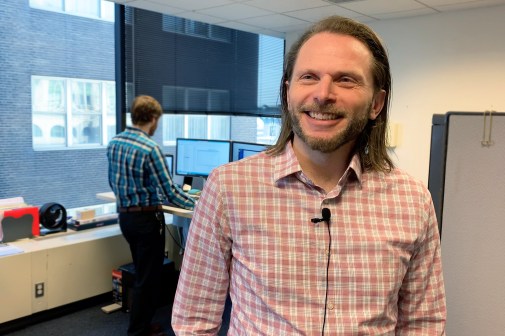After ‘transformative’ term, Kansas City CIO Bob Bennett to depart

Bob Bennett announced Tuesday he will step down next month as Kansas City, Missouri’s chief innovation officer.
“I have had a great, great, great run in the three and a half years I’ve been in this gig, but I need to make room so the next mayor and manager team can implement their vision,” Bennett told StateScoop.
Kansas City Mayor Sly James, who appointed Bennett in December 2015, is term-limited, will leave office following the June 18 mayoral election. A primary election on April 2 will narrow the current field of six candidates to two and city leadership is expected to name an interim CIO to take over between Bennett’s departure and when the new mayor appoints a successor.
“The dynamic of the community is going to change,” Bennett said. “To the extent that I can support [the transition and next administration], obviously I’m making myself available.”
Bennett said he has decided to leave government and that his next destination has not yet been decided. For now he will move to the private sector, he told StateScoop, and continue to work in the “smart cities” field.
“I’m extremely excited at the chance to get back into the private sector — I have not been there since 1987, so that will be kind of cool,” he said.
He pointed to helping city departments embrace technology in a productive way as his greatest achievement.
“I’m most proud of [the fact that] across our city government, people are embracing tech for people’s sake, not for tech’s sake,” Bennett said.
Kansas City is currently in the process of awarding contracts for a “comprehensive smart city partnership,” Bennett said.
“It’s going to fundamentally change the way that our city looks at and manages infrastructure buildouts and data analysis and collaboration inside City Hall,” Bennett said.”For me, the idea that we have seen that change, not just articulated in a motivational poster, but in a contract document which will have budgetary impact, which will have impact for citizens, in terms of how their city is managed, is probably the thing I’m most excited about.”
While it took almost Bennett’s entire time as CIO to get to this point, he said he feels as if a fundamental change has come to Kansas City government.
“The change has come. Has it come as quickly as I wanted? Eh, probably not. Has it come the way that I envisioned it? Certainly not,” Bennett said. “But I mean, let’s face it, there are people in [city] departments who have gained wisdom the hard way over a number of years. Those adjustments needed to be made.”
It’s that change, Bennett said, that makes him feel most confident about leaving city government service.
“I’ve watched our government change, and I know that it’s future-oriented,” Bennett said. “I know that we are laying the foundation for my kids to live in the smartest Kansas City they can possibly live in. That means that they’re going to stick around and that means they’re going to have a chance to compete and succeed in a 21st century job market. That makes me very happy.”
‘Too freaking cool’
Bennett joined Kansas City government after a nearly 25 years the Army, a military career he said helped shape his approach to collaboration and his interest in public service. Starting with the city shortly after the U.S. Department of Transportation announced its Smart Cities Challenge — which Kansas City competed for and lost to Columbus, Ohio — Bennett said collaboration was an early part of his strategy and his approach, both internally in the Kansas City metro area, and externally through smart cities events and groups.
He said that while neighboring towns may not have professional sports teams that garner national recognition, their participation has been valuable just the same.
“There are no Parkville Chiefs. There’s no such team as the Overland Park Royals, but yet those communities as part of our metro area are a critical piece of understanding both how our communities work and how we’re going to solve problems,” Bennett said. “The problems themselves don’t necessarily honor municipal boundaries.”
Bennett also pointed to his attendance and participation at smart city events — from this year’s South by Southwest Interactive where Kansas City hosted panels and conversations, to his work with Mastercard’s CityPossible effort, which aims to bring cities together to share ideas.
“Being a guy who had very little experience in local government, to be embraced by them and be offered the opportunity to actually contribute some meaningful work to those projects regardless of where they were, and to get feedback on the projects I had going, was absolutely critical,” Bennett said. “It certainly sped up our ability to get things done and not just talk about what a smart city could be.”
That work and collaboration, Bennett said, will drive his own future, as well.
“I am remaining in the smart cities space, because this experience has been too professionally fulfilling for me to give up a chance to work in this industry with these people,” Bennett said. “It is way, way, way too freaking cool.”
As he makes his exit, Bennett said he would not leave city government if James were able to remain in office.
“Anybody who has spent time with Mayor Sly James embraces every single moment that you can have in that relationship,” Bennett said. “I’ve been very blessed to work with him, I’ve been very blessed to have the opportunity to help implement his vision and to operationalize it in the smart cities space and yeah, I would run through walls for that guy.”
For his successor, Bennett recommends the next CIO “take a couple of months” to assess where things are and what’s coming, with a specific focus on engaging people who might not have been engaged before.
“The folks who are kind of in the back row of some of those meetings have the wisdom and the experience but don’t necessarily get called upon,” Bennett said. “That’s where you’ll find a lot of nuggets of awesomeness.”





